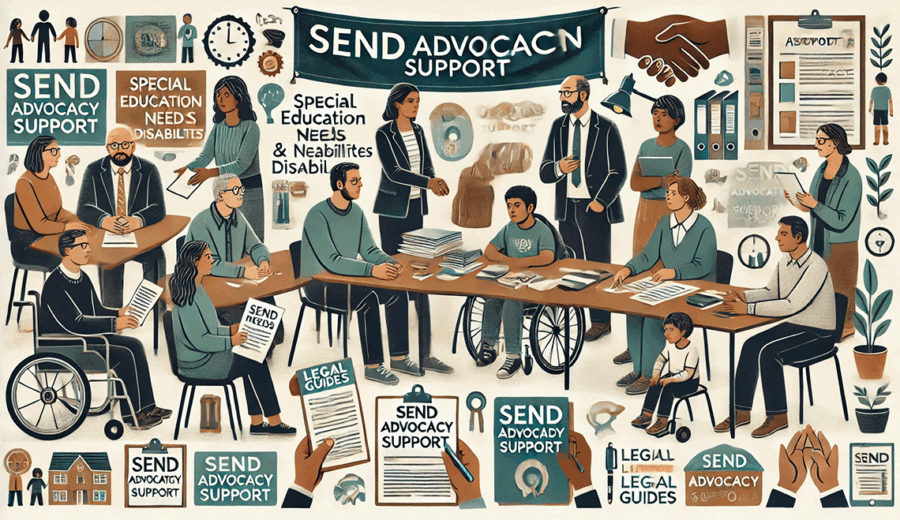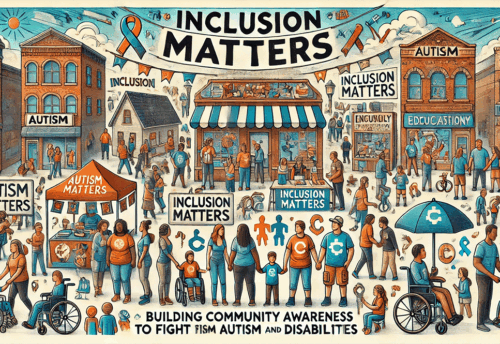
November 27, 2024
The Role of Advocacy Groups
The Role of Advocacy Groups in Supporting SEND Families in the UK
Advocacy groups play a crucial role in assisting families of children with Special Educational Needs and Disabilities (SEND). These organizations offer guidance, resources, and representation, empowering families to navigate challenges in education, healthcare, and social services. Here’s a comprehensive guide on their role:
1. What Are Advocacy Groups?
1.1 Definition
- Advocacy groups are organizations that support individuals and families by promoting their rights and helping them access essential services.
1.2 Focus Areas
- Education: Ensuring appropriate support and placements for SEND children.
- Healthcare: Facilitating access to therapies and medical services.
- Social Inclusion: Promoting acceptance and reducing stigma.
2. Services Provided by Advocacy Groups
2.1 Legal Guidance
- Offer advice on laws like the Children and Families Act 2014 and the Equality Act 2010.
- Assist families in understanding and accessing their legal rights.
2.2 Support with EHCPs
- Help parents apply for, review, and challenge decisions related to Education, Health, and Care Plans (EHCPs).
- Provide templates for letters and guidance on navigating local authority processes.
2.3 Tribunal Representation
- Represent families during SEND Tribunal cases, ensuring fair hearings and outcomes.
2.4 Emotional Support
- Offer counseling and peer support groups for families coping with the challenges of raising a child with SEND.
2.5 Training and Workshops
- Conduct sessions on understanding SEND rights, effective communication with schools, and self-advocacy skills.
2.6 Connecting Families to Resources
- Link families to financial aid, respite care, and specialized educational or therapeutic services.
3. Key Advocacy Groups in the UK
3.1 IPSEA (Independent Parental Special Education Advice)
- Provides free legal advice and representation for SEND families.
- Specializes in EHCP appeals and tribunal cases.
3.2 Contact
- Supports families with resources, helplines, and grants.
- Offers advice on managing medical and educational needs.
3.3 SENDIASS (SEND Information, Advice, and Support Services)
- Local services that provide impartial advice on SEND rights and support.
3.4 National Autistic Society
- Focuses on advocating for individuals with autism and their families.
- Provides resources on education, employment, and daily life skills.
3.5 Scope
- Aims to create equality for disabled individuals by promoting inclusive education and employment practices.
4. How Advocacy Groups Empower Families
4.1 Knowledge Building
- Educate families about their rights and available services.
- Provide tools and resources to make informed decisions.
4.2 Representation
- Amplify family voices in decision-making processes with schools, councils, and healthcare providers.
4.3 Community Building
- Create networks where families share experiences and support one another.
4.4 Policy Influence
- Campaign for changes in laws and practices to improve outcomes for SEND children.
5. Benefits of Engaging with Advocacy Groups
- Access to Expertise: Guidance from professionals knowledgeable in SEND law and services.
- Reduced Stress: Support in handling complex and emotionally charged situations.
- Improved Outcomes: Advocacy often leads to better educational and healthcare support for children.
6. Challenges Faced by Advocacy Groups
6.1 Limited Resources
- Many groups operate with limited funding and staff, which may affect availability.
6.2 Awareness Gaps
- Families may not know about these services or how to access them.
6.3 Systemic Resistance
- Advocacy groups often face challenges when pushing for systemic changes.
7. How to Get Involved
7.1 Reach Out
- Contact local or national advocacy groups directly through their websites or helplines.
7.2 Join Parent Forums
- Participate in online or in-person forums to connect with other families and advocates.
7.3 Volunteer
- Support advocacy groups through volunteering or fundraising efforts.
8. Measuring Advocacy Impact
- Education: Increased access to EHCPs and inclusive education.
- Healthcare: Improved availability of therapies and interventions.
- Social Inclusion: Greater acceptance and understanding within communities.
Advocacy groups are invaluable allies for SEND families, offering expertise, support, and a powerful voice to ensure children receive the care and opportunities they deserve. Engaging with these organizations can transform challenges into achievable goals, creating a brighter future for SEND families.





Leave a Reply